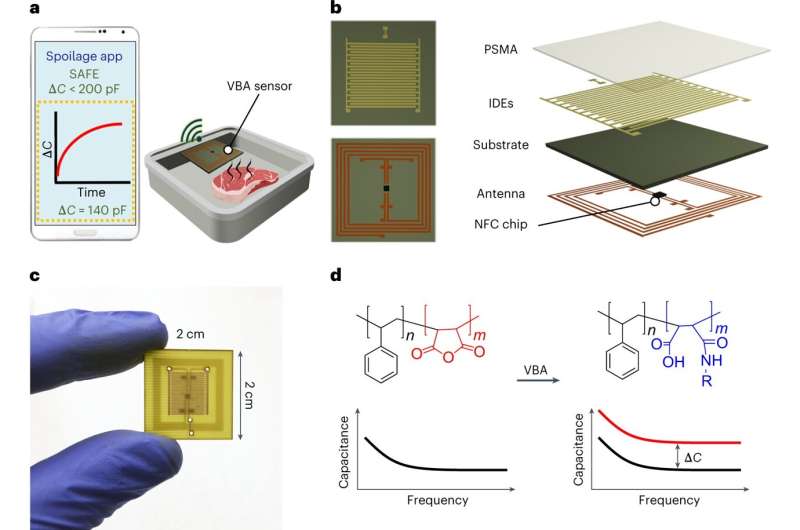Wireless sensor enables real-time spoilage alerts on food

Food waste and food-borne diseases are among the most critical problems urban populations face today. They contribute to greenhouse emissions tremendously and amplify economic and environmental costs. Since food spoilage remains the main reason for this waste, the circumstances of processing, transporting, and preserving food still need to be improved in line with current technological advancements.
Current monitoring processes are conducted in laboratories and use expensive chromatographic devices. These not only require too much time but also excessive resources and qualified personnel. So, present methods unfortunately prove to be inefficient in today’s circumstances.
New research published in Nature Food presents a significant alternative to this process: A new user-friendly, cost-effective, and up-to-date sensor that can be applied on food directly and replace lab-monitoring. The 2 x 2 cm miniature wireless device introduced in the paper offers real-time measurement, is battery-free and smartphone-compatible. It is expected to be highly effective especially in high-protein foods such as beef, chicken, and fish.
The research was led by Dr. Emin İstif (Molecular Biology and Genetics, Kadir Has University) and Asst. Prof. Levent Beker (Mechanical Engineering, Koç University) with the contribution of Prof. İskender Yılgör and Dr. Emel Yılgör (Chemistry, Koç University), Asst. Prof. Çağdaş Dağ (Molecular Biology and Genetics, Koç University) and Asst Prof. Hatice Ceylan Koydemir (Texas A&M University).
While existing solutions focus on the change in color of food, this new device, for the first time, offers a capacitive measurement method and thus utilizes near-field communication (NFC) technology with power-free and wireless communication. The authors indicate that this eliminates major disadvantages encountered in resistive devices such as moisture sensitivity and incorrect data due to distance.
The invention will not only provide companies the opportunity of reducing costs but also help consumers tremendously. Once widely commercialized, the device will enable continuous monitoring on shelves and allow users to control freshness right before buying a product or even before consumption at home. This opportunity of on-demand spoilage analysis via mobile phones will ultimately help preventing food waste and food-borne diseases.
With its cost-effectiveness and accessibility, the authors hope to contribute to the greater struggle against global warming and greenhouse emissions more effectively and quickly. The next steps will be to focus on increasing the potential for commercialization of the product in the near future.
More information:
Emin Istif et al, Miniaturized wireless sensor enables real-time monitoring of food spoilage, Nature Food (2023). DOI: 10.1038/s43016-023-00750-9
Citation:
Wireless sensor enables real-time spoilage alerts on food (2023, June 9)
retrieved 9 June 2023
from https://phys.org/news/2023-06-wireless-sensor-enables-real-time-spoilage.html
This document is subject to copyright. Apart from any fair dealing for the purpose of private study or research, no
part may be reproduced without the written permission. The content is provided for information purposes only.
For all the latest Science News Click Here
For the latest news and updates, follow us on Google News.

